
Competing in a triathlon or in long distance races requires lots of energy over extended periods. Coenzyme Q10 is instrumental in the body’s production of ATP, the body’s basic unit for the storage of energy in its chemical form.
What about Coenzyme Q10 and energy and physical fitness, I have been wondering. I know that Coenzyme Q10 in its ubiquinone form plays a vital role in the production of adenosine triphosphate (ATP) molecules in the mitochondria in the cells.
The ATP molecules are the basic units of energy in the body. The ATP molecules are what provide the energy for the contraction and extension of muscles.
Q10 and ATP and muscle aches and fatigue
Even when we are rested up, we do not have enough ATP molecules to allow us to exert ourselves intensely for more than a few minutes. When we exercise very intensively (run sprints, for example) or exercise strenuously for longer periods, our muscle tissues are forced to go from aerobic energy production, i.e. from burning oxygen, to the anaerobic (non-oxygen-burning fermentation) mode of energy production.
Anaerobic energy production leads, in turn, to the build-up of lactate in the muscle tissues. The build-up of lactate in the muscles is what gives us muscle aches and fatigue. Actually, a colleague tells me that the latest thinking is that when we are doing long-lasting muscle work, the aching and the fatigue are primarily caused by the muscle cells’ losing potassium. Lactic acid is then formed, paralyzing the muscles for the purpose of protecting them (the muscles) against overwork.
Mitochondria never saturated with Q10
As we get older, we do not have high enough concentrations of ubiquinone Q10 in our cells and tissues to saturate the mitochondria. And we cannot eat enough foods containing ubiquinone Q10 – the form of Coenzyme Q10 that is absorbed in the small intestine – to make up the difference.
More Q10, more ATP production possible
So, logically, the absorption that we can get from a ubiquinone Q10 supplement should improve the energy production process in the cells and in the body as a whole and in the heart muscle in particular.
Need Coenzyme Q10 to make ATP
Regular consistent exercise is good for us despite the risk of the strenuous exertion’s sending our bodies into anaerobic energy production. With more exercise, we actually increase the number of mitochondria in our cells, and, with more mitochondria in our cells, we can produce more ATP. With more ATP, we can delay the onset of anaerobic energy production and the buildup of lactate and the feeling of aching and being tired.
Q10 for electron transfer
But, remember, we absolutely need ubiquinone Q10 molecules inside the inner mitochondrial membranes to do the necessary transfer of electrons (and protons) that results in the formation of ATP molecules. Our bodies cannot convert carbohydrates and fats to ATP without the help of Coenzyme Q10.
Q10 and exercise: from theory to practice
That (Coenzyme Q10’s role in the electron transfer chain) is how I understand the theoretical explanation of the role of Coenzyme Q10 in energy production. It is the reason why we need a Coenzyme Q10 supplement if we are going to exercise efficiently.
Q10 and exercise: will Q10 improve performance?
Ah, yes, what does the clinical research show? As you might expect, some studies do show significant gains on one or another variable for the Q10-supplemented athletes as compared to the athletes in the placebo group.
Let’s take a look at the studies that do show a significant beneficial effect of ubiquinone Q10 supplementation.
Dr. Rosenfeldt’s 2003 review of the Q10 and exercise studies
As I have reported earlier on this q10facts.com website, Dr. Franklin Rosenfeldt and his colleagues at Alfred Hospital in Melbourne, Australia, conducted a systematic review of eleven small but well-designed studies of Q10 supplementation of athletes (4). In six of the studies, the athletes did show significant improvement in performance or exercise capacity. In five of the studies, there was no statistically significant improvement seen in the variable(s) that were being measured.
Dr. Deichmann’s review of Q10 and exercise studies
In 2010, Dr. Richard Deichmann and his colleagues from the Ochsner Medical Center in New Orleans published a review of more recent studies. They highlighted six studies in which the administration of Coenzyme Q10 had had a beneficial effect (1). They also summarized two studies in which the administration of Coenzyme Q10 did not show a clear beneficial effect.
Dr. Deichmann’s study of older athletes taking statins
Then, in 2012, Dr. Deichmann and his colleagues reported on the results of a clinical study that they themselves had conducted. In their study, 20 athletes aged 50 years or older who were taking statin medications received 200 mg of Coenzyme Q10 daily or placebo for 6 weeks in a randomized, double-blind, placebo-controlled, crossover study (2). The purpose of the study was to test the effect of Q10 supplementation on the older athletes’ anaerobic threshold (AT). There were also several secondary endpoints in the study.
The anaerobic threshold could easily be called the lactate threshold. Anaerobic threshold refers to the level of intensity (of exercise or athletic performance) that causes lactate to build up in the muscles faster than it can be used for energy purposes.
In the Deichmann study, the treatment with Q10 did not significantly improve anaerobic threshold in older athletes who were taking statins. But, the researchers reported that Q10 supplementation improved muscle performance as seen in the “time to anaerobic threshold” and in leg strength. Q10 treatment also improved other measures of mitochondrial function.
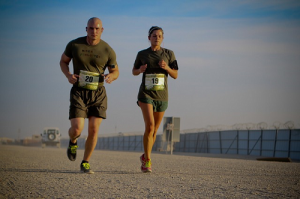
Strenuous exercise causes increased oxidative stress, increased inflammation, and increased muscle damage. Supplementation with a well-absorbed ubiquinone Q10 supplement can help to reduce the stress and the damage.
Spanish study of Q10 supplementation and strenuous physical activity
All of the participants in a 2012 Spanish study were highly trained male amateur runners who exercised every day (3). All of the athletes were within three years of age 40. The athletes were randomly assigned to a Q10 treatment group (n=10) and to a placebo control group (n=10). Prior to undertaking a 50-kilometer run, the athletes in the Q10 treatment group were given one 30-mg capsule 2 days before the test with their dinner, three 30-mg capsules on the day before the run (at breakfast, lunch, and dinner), and one 30-mg capsule on the day of the run one hour prior to the start of the run.
The run was a constant run for 50 kilometers that involved much uphill running and a high degree of effort over an extended period of time. It involved the type of exhausting exertion that causes muscle damage and the production of free radicals and pro-inflammatory mediators.
The supplementation with Coenzyme Q10 in the days leading up to the strenuous exercise significantly decreased the extent of oxidative stress on several measures. Moreover, the supplementation was positively associated with measures showing reduced muscle damage following the conclusion of the run.
Why the need for Q10 in athletes taking statins?
There seem to be three basic reasons for urging people taking statin medications to take a ubiquinone Q10 supplement in order to improve their exercise capability.
- Statins shut off the production of Q10. The same biological pathway that produces cholesterol also produces ubiquinone Q10. Shutting down the production of cholesterol through the use of statins also shuts down the body’s synthesis of Q10.
- Statins are effective at reducing the amount of low-density-lipoprotein cholesterol in the blood. However, the LDL lipoproteins serve as carriers for the Q10 molecules in the blood. Fewer LDL lipoproteins means fewer Q10 carriers.
- Statins induce muscle aches and fatigue. Complaints of muscle aches and pains, ranging from discomfort to severe pain, are not uncommon in patients taking statins medications. In fact, the US Food and Drug Administration has issued a warning to this effect.
Why take Q10 for exercise purposes?
So, wrapping up this discussion of Q10 and exercise, what do we know?
- There is a low risk of adverse effects – practically no risk at all — associated with taking ubiquinone Q10 supplements.
- There are affordable Coenzyme Q10 supplements available – on the order of one dollar per day or a bit less.
- There are certainly potential benefits for health and fitness – for heart health in particular.
All things considered, taking a ubiquinone Q10 supplement confers many more potential benefits than potential risks.
Sources:
- Deichmann, R., Lavie, C., & Andrews, S. (2010). Coenzyme q10 and statin-induced mitochondrial dysfunction. The Ochsner Journal, 10(1), 16-21.
- Deichmann, R. E., Lavie, C. J., & Dornelles, A. C. (2012). Impact of coenzyme Q-10 on parameters of cardiorespiratory fitness and muscle performance in older athletes taking statins. The Physician And Sportsmedicine, 40(4), 88-95.
- Díaz-Castro, J., Guisado, R., Kajarabille, N., García, C., Guisado, I. M., de Teresa, C., & Ochoa, J. J. (2012). Coenzyme Q(10) supplementation ameliorates inflammatory signaling and oxidative stress associated with strenuous exercise. European Journal Of Nutrition, 51(7), 791-799.
- Rosenfeldt F. et al. Systematic review of effect of coenzyme Q10 in physical exercise, hypertension and heart failure. Biofactors (Oxford, England). 2003;18(1-4):91-100.




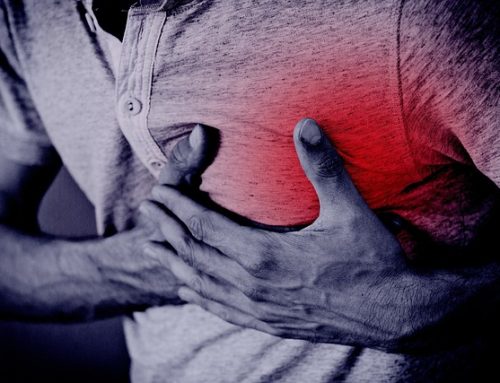
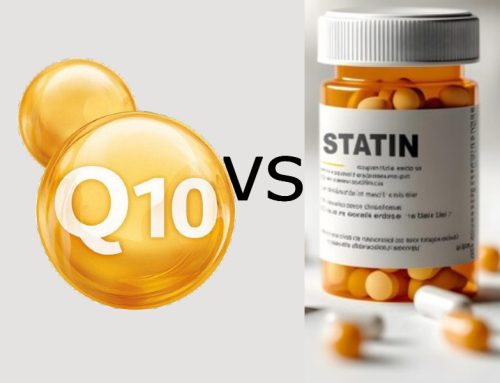
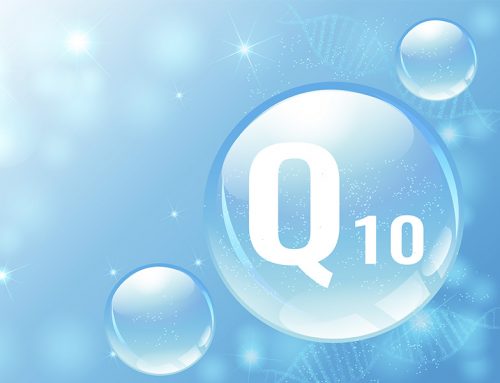
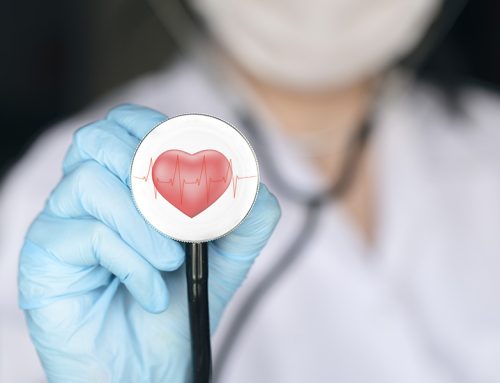

Leave A Comment